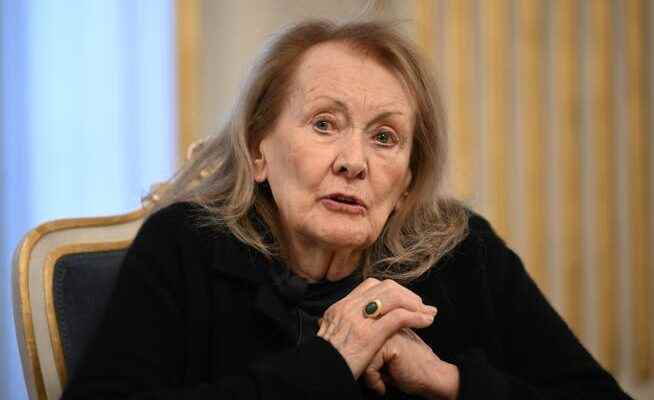The Swedish king will present this year’s Nobel prizes on Saturday. Annie Ernaux had announced an engaging speech for the occasion and brought up a lot of political things. But the Frenchman has disappointed some expectations.
Annie Ernaux at a press conference in Stockholm, December 6, 2022.
You won’t back down. This announcement was made by Annie Ernaux on October 6th. It had just become known that the French would receive the Nobel Prize for Literature. She sees a responsibility in the award, she stated at the first press conference, and held out the prospect of a combative Nobel Prize speech: in Stockholm you have the opportunity to say things that will then be spread around the world. Before that, according to the politically committed author, she will not shirk.
Two months later, Annie Ernaux kept her word. In her half-hour speech, she touched on a number of political topics, from the oppression of women in Iran to the impending climate catastrophe – but without going into any depth and only at the very end of the speech.
The democratic me
The bulk of Ernaux’s lecture revolved around her reading and writing. The author, who grew up in humble circumstances in Normandy, recapitulated her search for a language that describes the life of her home environment without exhibiting it. This linguistic form also includes the narrative perspective: Ernaux, who often writes in the first person, firmly defended the use of the ego. Some critics suspect a silly narcissism in Ernaux’s «Je»; they themselves regard the form as a democratic achievement. Because up until the 18th century it was a privilege of the nobles to report on their own deeds in memoirs or other books. It was only the revolutionary idea of equality that made it possible for every person, regardless of status and origin, to write their own history.
Of course, the author does not want this I to be understood as a singular phenomenon. Based on her experiences as a woman and as a class refugee – Ernaux was the first in her family to study and make the “climb” to Paris – she wants to explore topics such as pain, relationships or shame that are of general human importance: Her “I », according to Ernaux, should be suprapersonal, the singular leading to the universal.
And after poetry then politics. As an author, she is concerned with the place that women occupy in the literary world, said Ernaux, noting: “The fact that they write works is not automatically considered legitimate.” In France and elsewhere, books written by women are simply ignored by some male intellectuals. In this respect, the Nobel Prize is also a “sign of justice and hope” for all female authors. Ernaux is the 17th woman and the first French woman to be honored with the world’s most important literary prize.
duty of vigilance
For Ernaux, it goes without saying that she expresses herself politically outside of literature – after all, she grew up in an era in which committed authors in France helped shape public discourse. She herself feels a duty to be vigilant, especially today, “silence is not appropriate in some moments of history.” So in the end, in a quick succession of sentences, she warned against an ideology of isolation spreading in Europe, condemned the imperialist war of the Kremlin dictator and denounced the greed for profit of the economic forces that was destroying the planet.
That was a lot all at once, but Ernaux didn’t address everything. In Germany, the award winner’s positions critical of Israel have been the focus of attention in recent weeks, and the decidedly left-wing author has signed various petitions from the BDS boycott movement. Jewish organizations had expected her to say something about it in her speech – she owed it to her readers, according to the Vice President of the Auschwitz Committee. Annie Ernaux, however, seemed to consider silence appropriate in this case.
